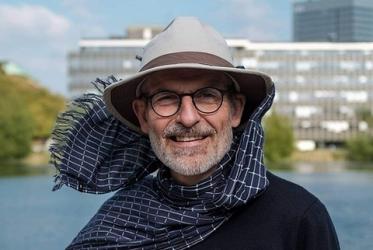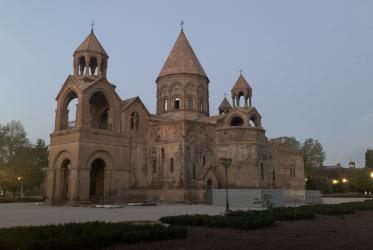Report of the consultation convened by CEC in cooperation with the WCC and the Serbian Orthodox Church, Oslo, 14-16 November 1999.
Church leaders and representatives from the Balkan region and other parts of Europe and North America met in Oslo, Norway, from 14 to 16 November 1999 to assess the Kosovo crisis and its impact on the Balkan region and the rest of Europe.
The Conference was organised by the Conference of European Churches in cooperation with the Serbian Orthodox Church, the World Council of Churches and the informal Vienna group of church leaders. We express our thanks and gratitude to the Church of Norway and the Norwegian government for hosting and generously supporting the conference.
We offer the following conclusions to the churches in Europe and North America and through the churches to governments and a wider public. Meeting just prior to the OSCE Summit, which is meant to adopt a European Security Charter, we also address ourselves to the heads of state and government gathered in Istanbul on 18 and 19 November.
1. The Kosovo crisis is not over. It is a European tragedy and also has consequences for global, international relations. Large parts of Kosovo and also other parts of Yugoslavia have been devastated. Hundreds of thousands of people have become refugees or internally displaced people. Neighbouring countries have had to share their scarce resources with an overwhelming number of refugees. Some refugees return, finding their houses bombed, burnt or looted. Others are fleeing just now or do not see any possibilities for return.
National and international political and religious leaders support the idea of a multi-ethnic and a multi-religious Kosovo. The reality is that Kosovo day by day is becoming more and more mono-ethnic. We are far from lasting peace and reconciliation among the different communities. The crisis has revealed a complex situation which requires careful analysis anda multifaceted approach before stable solutions can be found.
2. The crisis in Kosovo has again reminded us about the need to understand Europe as one organic entity. We have seen that the recent crisis and other recent conflicts have exploited the old differences in Europe between the part which adheres to the Eastern Christian legacy and the part which emerges from the Latin-Roman legacy - the dividing line from the year 1054. In this situation, it is important to underline that the Orthodox and Western Christian traditions are as two lungs in one European organism. Any attempt to deny the contribution of either of these traditions for European identity is a denial of our common heritage. There is no place for paternalism either between churches or between church agencies. All churches must be respected for the insights they have in their own societies and for the ability they have for contributing to the welfare and well-being of the peoples they serve.
We recommend that CEC organise a study of theological and historical reasons for present divisions in Europe and encourage the churches in Western and Eastern Europe to engage in renewed efforts to understand one another better and come closer to one another.
3. This crisis has again shown us how easily we accept stereotypical images of each other, and how easy it is for mass-media to contribute to the demonisation of individuals or groups of people. There is a need to counter this with balanced information and by seeking human and ecumenical fellowship with each other.
We recommend: The churches need to devise mechanisms whereby they together can share and evaluate information about potential conflicts with religious and ethnic components and also act to help prevent the escalation of conflicts.
4. Religion is an element in many conflicts, and it is also being exploited by many politicians. In the light of recent crises, there is an urgent need for dialogue among churches, and more especially for dialogue between churches and Muslim communities. There needs to be contact and cooperation between religious leaders, but first and foremost these dialogues have to take place primarily at the local level. In this way religious communities can play a role in conflict prevention and mediation. The future of Europe is also dependent upon its ability to let people and peoples with different religious convictions live side by side - all with equal rights and duties.
We recommend: The participating states of OSCE should also recognise the important role religious communities can play in conflict prevention and mediation.
5. The NATO bombing did not bring an end to human suffering in the area. It contributed to the humanitarian disaster and had devastating effects on the environment. One group of victims was replaced by another. The results of the military intervention show that this kind of action is not what is required to solve complex conflicts such as this one. As churches, we are committed to peace and reconciliation. If more resources and energy had been used as part of a long-term strategy in conflict prevention, military action could have been avoided. Such a strategy is less costly, saves human lives and helps build a culture of peace and friendly coexistence.
We recommend: As a contribution to the stability of the area, CEC should initiate the establishment of a centre for the support and coordination of peace and reconciliation work of religious communities across conflict lines in the Balkan region.
6. We are watching with great concern the developments in the Northern Caucasus, where civilians are becoming victims of military intervention. While fully understanding the necessity to overcome terrorism, we urge all parties involved in the conflict to ensure that the civilian population is not victimized and that the OSCE code of conduct of 1994 is fully respected, and to do everything possible to bring the conflict to a peaceful solution.
7. There is an urgent need to start the reconstruction of Yugoslavia. Nobody is served by a Yugoslavia in the midst of Europe which is physically devastated and isolated. It is a joint European and North American responsibility to secure funds and other resources for this effort. We do not believe that the present sanctions regime serves the reintegration of Yugoslavia into Europe. In fact the victims of the sanctions are primarily innocent people, including children and elderly persons.
We recommend that the Security Council of the UN review the effects of the present sanctions against Yugoslavia.
We recommend: There is a need for a cooperative mechanism to facilitate interchurch aid, information sharing and a continuous discussion of current problems in Yugoslavia with political leaders and other important sectors of the society. We invite ecumenical organisations and churches in the region to consider how this might best be given effect.
We recommend: The Churches should devise proposals and projects for immediate reconstruction. One such project could be an ecumenical effort to rebuild a bridge across the Danube, Europe`s river of life. This bridge would be a symbol of the bridges we need to build between different parts and religious traditions of Europe.
8. The immediate need in the Balkan area is to help people through the winter with proper housing, food and energy supply. Churches and humanitarian organisations have already raised and distributed sizable funds to aid afflicted people and regions. This must be continued. Care should be taken to secure good cooperation with local church leaders as the most effective way of aiding people.
9. Young people are an integral part of the present reality in the Balkan region. It is important to see that they can be a yeast of peace and reconciliation. It is crucial to involve young people in dealing with the complex implications of the Kosovo crisis. Support offered to youth networks and organisations is necessary in order to create a secure and non-violent society in the future.
10. As churches, we are painfully aware of the inadequacy of our own response to the tragedy in Kosovo. We have learned once more that peace-building is costly, in terms of spiritual stamina, political courage and physical resources. But peace-making is our calling and we can fulfill it in many ways. Strengthening links between churches in different countries will give us early warning of situations which can lead to conflict. When we support each other and our communities, we can speak with credibility to political decision-makers. By doing this we also fulfill our biblical calling: Carry one another's burdens, and in this way you will fulfill the law of Christ. (Gal.6,2)



